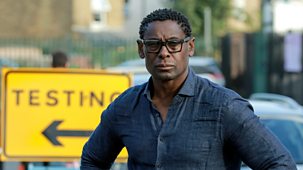
Episode 07 March 2021
At the age of 23, actor David Harewood had a psychotic breakdown, a condition he later discovered was far more likely to affect black men. After the shocking news broke that black, Asian and minority ethnic patients were dying in disproportionate numbers from Covid-19, David felt compelled to discover the reasons why. \n\nDavid starts his journey in Brent, north west London. During the first wave of the pandemic, the borough had the highest Covid-19 mortality rate in the country. It is also one of the UK's most diverse areas, where nearly 65 per cent of the local population are black, Asian or from other minority ethnic groups. \n\nHe visits Dr Tariq Husain, head of the Intensive Care Unit at the nearby Northwick Park Hospital, who describes the tidal wave of cases that overwhelmed their capacity, five times more than the usual rates of admissions, and the fact that people from minority communities seemed to be the hardest hit. \n\nWas this just an isolated incident? To find out, David visits Dr Guddi Singh, a paediatric doctor and health expert, who reveals that what happened in Brent is mirrored across the country. Staggeringly, as a black man, David is nearly three times more likely to die from Covid-19. What is it about being black that puts David at such an increased risk? Dr Singh explains that a big risk factor is the job that you do. Key workers risk their lives, exposing themselves to the virus as they keep the country running.\n\nYet people from black and minority ethnic backgrounds are more likely to do these jobs. David visits Tamira, whose father was one of the first members of NHS staff to die from Covid-19. She believes not enough was done to protect him at work. A heart-wrenching but all too common story. \n\nBut why do so many people from minority communities do these frontline jobs? David visits his sister Sandra in Birmingham, where they both grew up. They discuss their parents’ experiences as new migrants to the UK in the 50s, and how your skin colour still impacts your chances of getting a job you want. This discrimination keeps whole sections of society at the bottom of the ladder, a process known as systemic racism. \n\nMoving on from how people catch Covid-19, David visits Dr Marina Soltan, a respiratory doctor whose research shows that patients with chronic conditions such as hypertension or kidney disease are nearly twice as likely to die from Covid-19, and that many patients with these conditions come from deprived areas. \n\nBut how can where you live affect your health? Not just in terms of Covid-19 but a range of other diseases? David meets Andrew Grieve, an air quality expert from Kings College London, who reveals how air pollution can harm every organ in your body, and that the lower your household income is, the greater your exposure to air pollution.\n\nThe consequences of this can be devastating. Rosamund Adoo-Kissi-Debrah lost her nine-year-old daughter Ella in 2013 to a fatal asthma attack. After discovering that Ella’s most severe attacks coincided with local spikes in pollution, she began campaigning to get air pollution listed as a cause of her daughter’s death. In a landmark ruling in December 2020, the coroner found in her favour, the first time ever that air quality has been acknowledged as a cause of death in the UK.\n\nIt is becoming increasingly clear to David that deprivation can have a huge impact on health, and that people of colour are proportionately more likely to live in deprived conditions. But are environmental factors the only explanation for this disparity? Academic Dr Jenny Douglas shares research that black women are five times more likely to die during pregnancy and childbirth than their white counterparts, and that many of the women she has interviewed for her research felt their concerns were not listened to by health professionals.\n\nDavid is gradually moving to the unhappy conclusion that systemic racism, be it conscious or unconscious, could be contributing to poorer health outcomes. But a radical theory developed by American professor Arline Geronimus suggests that living with racism can actually have a physiological impact on the body, meaning that black patients age faster and suffer from poor health much earlier - a process she calls 'weathering'. It is a shocking revelation.\n\nConvinced that if there is to be an improvement in the health outcomes for black patients, the role racism plays needs to be acknowledged, David interviews Kemi Badenoch, the government’s minister for equalities. He wants to know why she has dismissed the idea racism might have played a role in putting black and minority ethnic communities at risk from Covid-19. \n\nHe ends his journey frustrated but with some hope. The stark inequalities exposed by Covid-19 and the Black Lives Matter movement have come together at a pivotal time, one he believes can be a moment of change.
Source: BBC 1
Most recent episodes of Why Is Covid Killing People of Colour?
Why Is Covid Killing People Of Colour?
Episode 07-03-2021
At the age of 23, actor David Harewood had a psychotic breakdown, a condition he later discovered was far more likely to affect black men. After the shocking news broke that bla ...
07-03-2021
BBC 1
Most popular episodes of Why Is Covid Killing People of Colour?
Why Is Covid Killing People Of Colour?
Episode 07-03-2021
At the age of 23, actor David Harewood had a psychotic breakdown, a condition he later discovered was far more likely to affect black men. After the shocking news broke that bla ...
07-03-2021
BBC 1

